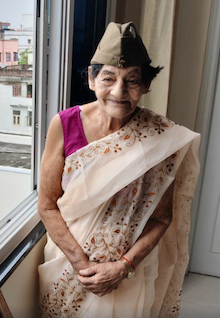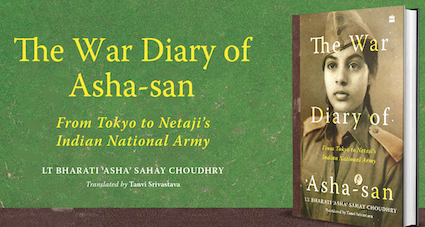A young woman’s translation of war diaries maintained by her grandmother is making many in the corridors of power in India sit up and take notice, it is a shocking history lesson.
The War Diaries of Asha-San is a female soldier’s life who had been documenting the nightmares of World War2 in handwritten notes, probably using small, broken pencils. Lt Bharati Sahay Choudhry, who was named Asha that translates into hope, wrote about everything that happened in WW2 and how it affected her family life. And she wrote in Japanese, not easy to decipher by anyone and everyone.
The book is fascinatingly brilliant.
If it was a routine WW2 diary, it would have been consigned into some obscure corner of the sardine-packed shelves of book stores. But it did not happen. Why? She was in a regiment that was commanded by none other than Netaji Subhas Chandra Bose, leader of the Indian National Army which collaborated with the Japanese and Germans against the British. The fate of Bose still remains a mystery in India despite a few, long-drawn investigations into his disappearance that always contradicted the official version of the Indian government.
And then Bose was no ordinary person. He was a traitor to the British because he joined hands with Hitler. But there are millions and millions of Indians who strongly believe that Bose was India’s best patriot who took a heroic stance against British imperialism.
What is interesting is that Choudhry translated the Japanese notes into Hindi and then kept it in an old chip basket, often used by Indian women for sending food supplies like eggs, butter, vegetables and bread to neighbours. I get a feeling that Choudhry often prayed to the Gods to help the poor planet get out of the madness of the war, and deaths that surrounded her.
So, let’s return to the book.
Born in Kobe, a small city in Japan that is home to the nation’s oldest Shinto shrine, she was known as Asha-san in Japan and her parents, Anand Mohan and Sati Sen Sahay. Her parents were freedom fighters and closely affiliated to Bose’s and his dream, the INA. When she was born in 1928, the year when cartoon star Mickey Mouse appeared and Alexander Fleming discovered penicillin.
So, we should now describe her as Asha-san. For the record, san is a respectful suffix in Japanese language.
Asha-san saw the war from close, and was familiar with bombs, fire, death and trenches and total blackouts. Her father and uncle were at the war, and eventually she joined the Rani Jhansi Regiment when she was only 17 but had, by then, joined Tokyo’s reputed Showa Koja College (it has now been renamed Showa Women’s University) for higher studies.
Asha-san joined INA and rose to the rank of Lieutenant in the Rani Jhansi Regiment. She knew how to sing, she knew how to cook for herself and others and she knew how to fight. She would be very happy when British and US fighter planes was shot down by the Japanese and she recounts her interactions with Bose who called her, and members of the Rani Jhansi Regiment “brave women”. The idealist soldier travelled from Japan via Taiwan to Thailand to join the Rani of Jhansi Regiment. She eventually reunited with her mother Sati Sen in 1947.
The book brilliantly recounts what charged Asha-san up to fight the allied forces. It was all about the motherland, it was all about India. It was about fighting for India to get the nation liberated from the clutches of the British rulers.
Asha-san is now 94 year-old and lives in Patna with her son, Sanjay. She had returned to India a year before it attained independence. By then the INA had been defeated, the soldiers arrested. It was a sad moment for everyone, a very sad moment.

Her notes first got published in Dharmayug, a top Hindi magazine. And then it was compiled for a book titled Asha-san Ki Subhas Diary. She was not happy with the final product and eventually, her granddaughter in law translated her diaries into an English book. In her own words, Asha-san said the book is a reflection of her life. “When I originally wrote the Hindi version of my war memoirs in 1972, it was from scraps of paper and from my memories of my tumultuous teenage years in Japan, the country of my birth, in the 1940s. That it has now been translated into English by my granddaughter-in-law, Tanvi, is especially gratifying—she has been able to capture my emotions and the passion of those days.”
Asha-san says the idea behind the notes was simple. She wanted India’s generation next to read about the sacrifices of freedom fighters and the patriotic fervour of the Azad Hind movement led by Bose.
The book is written in a manner that it opens up on you in various parts, actually three parts. The first is obviously the story of an idealistic girl who wanted to give her everything for her motherland. And then she got an opportunity to live out her patriotism when Bose came to Japan in 1943 to build the Azad Hind Fauj.
The second part, from March till August 1945, tells the story of WW2 and everything associated with those days of death, losses and victories. And the final part of the book revolves around her return to India (March 1946-August 1947) and her ultimate bonding with her beloved motherland.
Somewhere the book reflects the pains of the soldiers of the INA who fought for the British and lost and then fought for the Japanese and lost and then they returned to an Independent India to see their third loss when the government totally ignored their contribution to India’s freedom movement.
War teaches you strange lessons, reminds you of strange memories and, as the book says, helps you understand pan-human universalism, reflected in the act of Japanese prisoners planting flowers around the pillars of soldiers of the Allied forces. Why not? “Death makes everybody one. Wherever the souls of our brave Japanese martyrs go, the souls of American martyrs go too. Friends and enemies exist here — not in the other realm. They have fulfilled the duty for their country — as have we. It is natural to pay tribute to all patriots,” the book quotes a Japanese prisoner.
What a brilliant line.
(Shantanu Guha Ray is a Wharton-trained journalist and award-winning author. He lives in Delhi with his wife and two pets. He won the 2018 Crossword award for his book, Target, which probed the NSEL payment crisis.)


